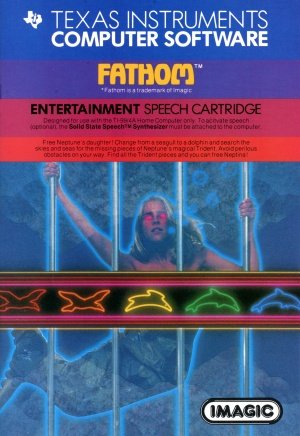Difference between revisions of "Fathom"
Amycjgrace (talk | contribs) (→Gameplay) |
Amycjgrace (talk | contribs) (→Front Cover of Manual) |
||
| Line 23: | Line 23: | ||
==Advertising Blurbs== | ==Advertising Blurbs== | ||
===Front Cover of Manual=== | ===Front Cover of Manual=== | ||
| − | + | Free Neptune's daughter! Change from a seagull to a dolphin and search the skies and seas for the missing pieces of Neptune's magical Trident. Avoid perilous obstacles on your way. Find all the Trident pieces and you can free Neptina! | |
===Back Cover of Manual=== | ===Back Cover of Manual=== | ||
Revision as of 02:06, 30 September 2022
Fathom is an Imagic created action video game for the TI-99/4A. It was programmed by Neil Mckenzie and released 3rd quarter of 1983 and released on Solid State SoftwareTM Command Module. It sold originally for $39.94 (USD) as part number PHM 3222.
| Fathom | |
|---|---|
 | |
| Publisher(s) | Imagic |
| Original Retail Price | $39.95 (USD) |
| Programmer(s) | Neil McKenzie |
| Part# | PHM 3222 |
| Format(s) | Solid State SoftwareTM Command Module |
| Release | 1983 (3rd Quarter) |
| Genre(s) | Action |
Contents
Gameplay
The goal for the player in Fathom is to ultimately rescue Neptune's daughter, Neptuna. She has been kidnapped by the sea Titans and is being held captive against her will. The player controls either a dolphin who navigates through the sea, or a bird who navigates the skies. The goal is to collect the missing pieces of Neptune's trident. As a bird, the player needs to tough all of the clouds while avoiding running into other birds in the air which will reduce the players energy level. As a dolphin, the player needs to touch the seahorses which reveal the trident pieces. Touching octopuses, sharks, and seaweed will also cause the player to lose energy. Once all the trident pieces have been collected, Neptuna will be released.
Advertising Blurbs
Front Cover of Manual
Free Neptune's daughter! Change from a seagull to a dolphin and search the skies and seas for the missing pieces of Neptune's magical Trident. Avoid perilous obstacles on your way. Find all the Trident pieces and you can free Neptina!
Back Cover of Manual
The Texas Instruments Football Command Module brings a new dimension of fun and excitement to the game. You and your opponent plan strategy, select offensive and defensive plays, and enjoy the action. It's an easy-to-use - but quite sophisticated - computer simulation of the game. Action for each play is determined from probability tables derived from professional football statistics. A "luck factor" makes the outcome different for each series of downs. Each game is unique!
Football module action will provide hours of fun and challenge for your family, at parties, or in tournaments with friends. It's exciting for the novice as well as the expert "armchair quarterback." These features are part of each game.
- Eleven offensive plays
- Seven defensive plays
- Outcomes computed from professional statistics
- Random action events - fumbles, penalties, unexpected outcomes based on a "luck factor"
- Complete computerized scoreboard - keeps track of game status, down, possession of the ball, timing
- Exciting visual displays and sound effects for touchdowns and winning points!
The Football Command Module is just one example of the depth, realism, and challenging fun that your TI Home Computer offers. Ask to see other Command Modules!
Triton Catalog - Fall 1984
Be a pro player! Real-life computer simulation of the game, based on actual pro statistics. Every game is different . . . pick the plays, call the defense, snap the ball! 1-2 players can really learn the game with inside expertise!
Fun Fact
According to the programmer, David Coons, one summer a student programmer went into the office during the weekend, and instead of typing IN (INstall Volume, the hard disk cartridge on which all of the project's code was located) typed INV(INitialize Volume) which formatted the disk, destroying all the code for the Football. There were no backups of the program code, so the programmers spent the next week retyping the code from old printouts they had created. Moral of the story: Always, Always Backup!! [3]
Manual
